Abstract
Recent trends in medical education include a shift from the traditional, didactic, lecture-oriented approach to a more student-driven, problem-based approach to learning. This trend provides librarians with an opportunity to develop programs to teach information-gathering skills that support and are integrated into problem-based learning (PBL). In 1992, the University of Pittsburgh School of Medicine implemented the initial phase of a curriculum revision that emphasizes PBL. Since that time, Falk Library of the Health Sciences has provided a large-scale, intensive program integrating information-seeking skills and activities into the first-year Patient-Doctor Relationship course, a sequence that initiates medical school. A multimodal approach to information seeking and sources is emphasized, utilizing print and audiovisual materials, computerized resources, and subject experts. The Falk Library program emphasizes the gathering and use of information as central to both PBL and student skills development. An informal, post-course evaluation was conducted to gauge which information resources were used and valued most by students. This article presents evaluation results, including data on the use of information sources and services, and student perceptions of the librarian's role in the PBL sessions.
Full text
PDF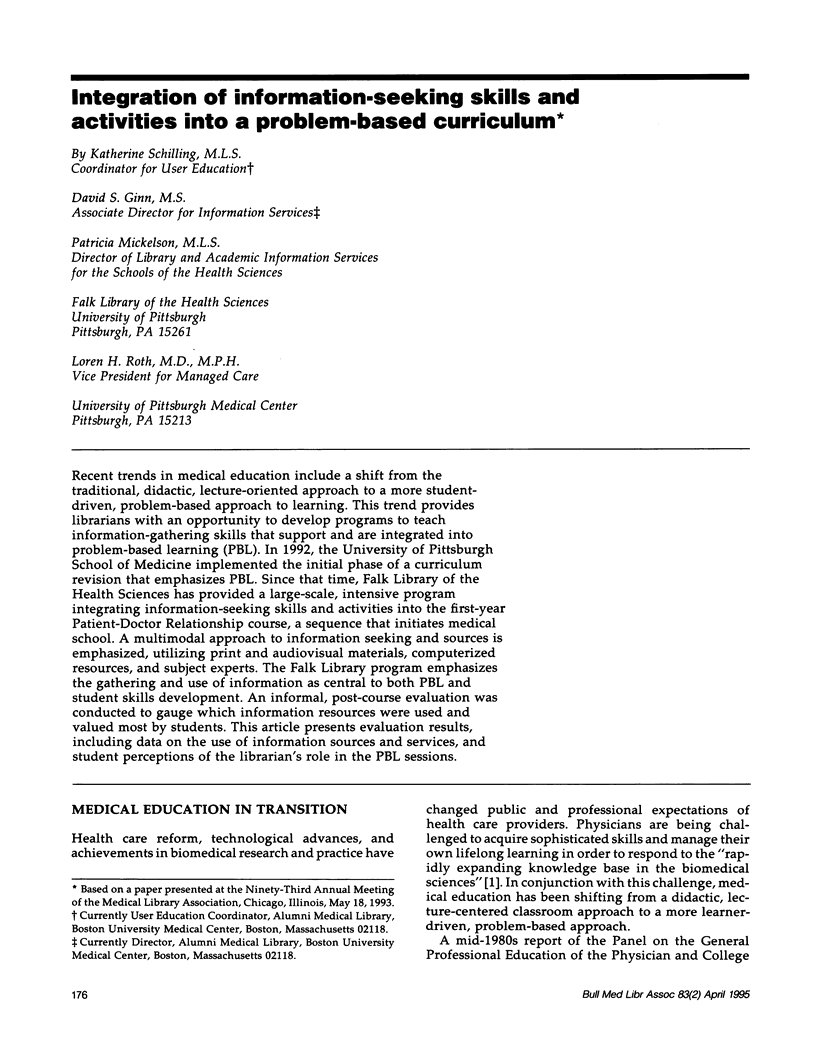
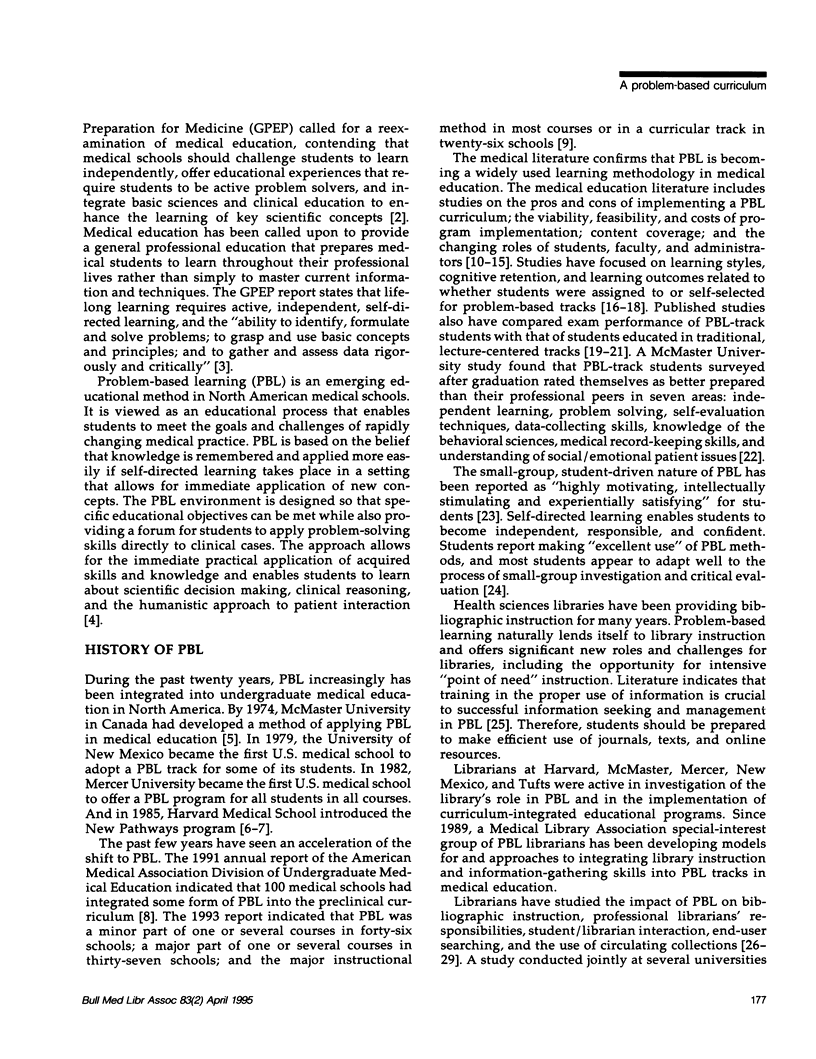
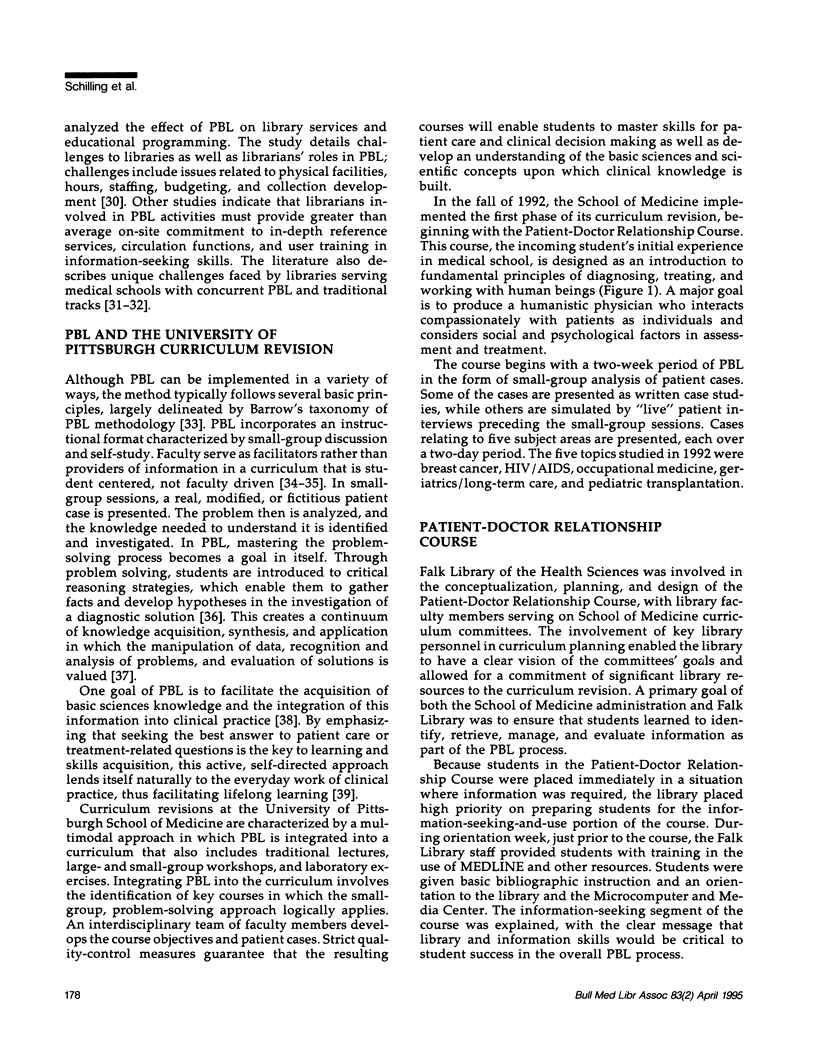
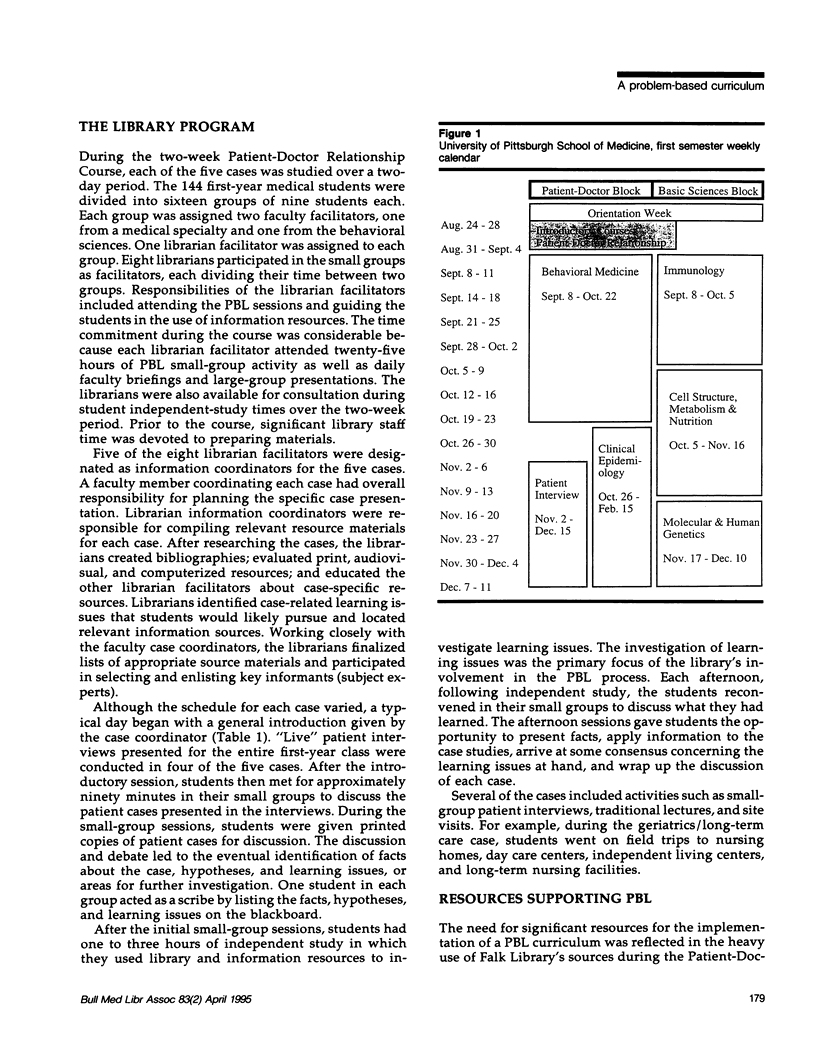
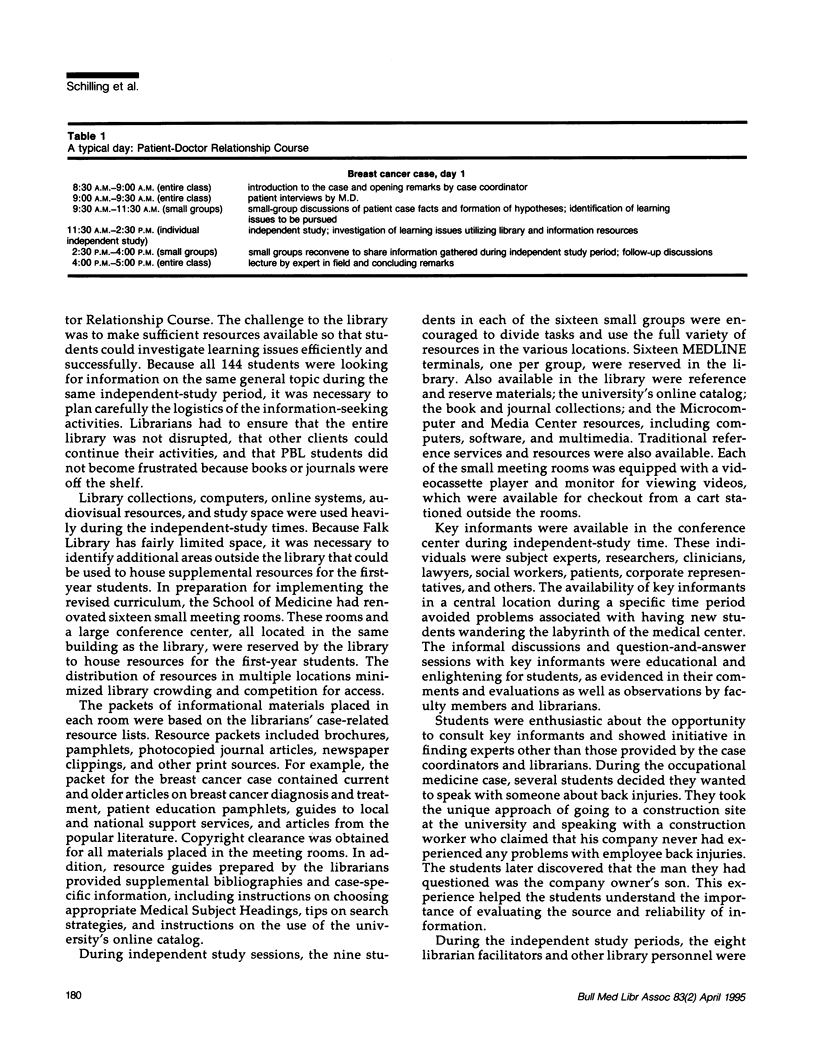
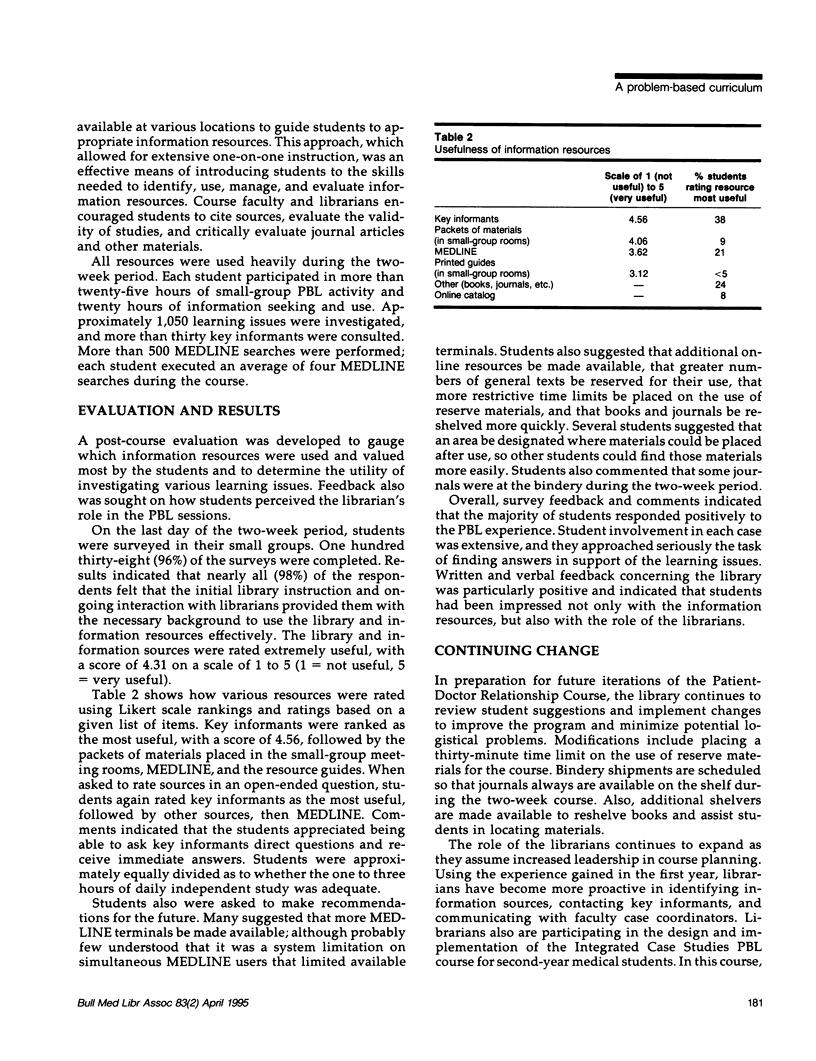
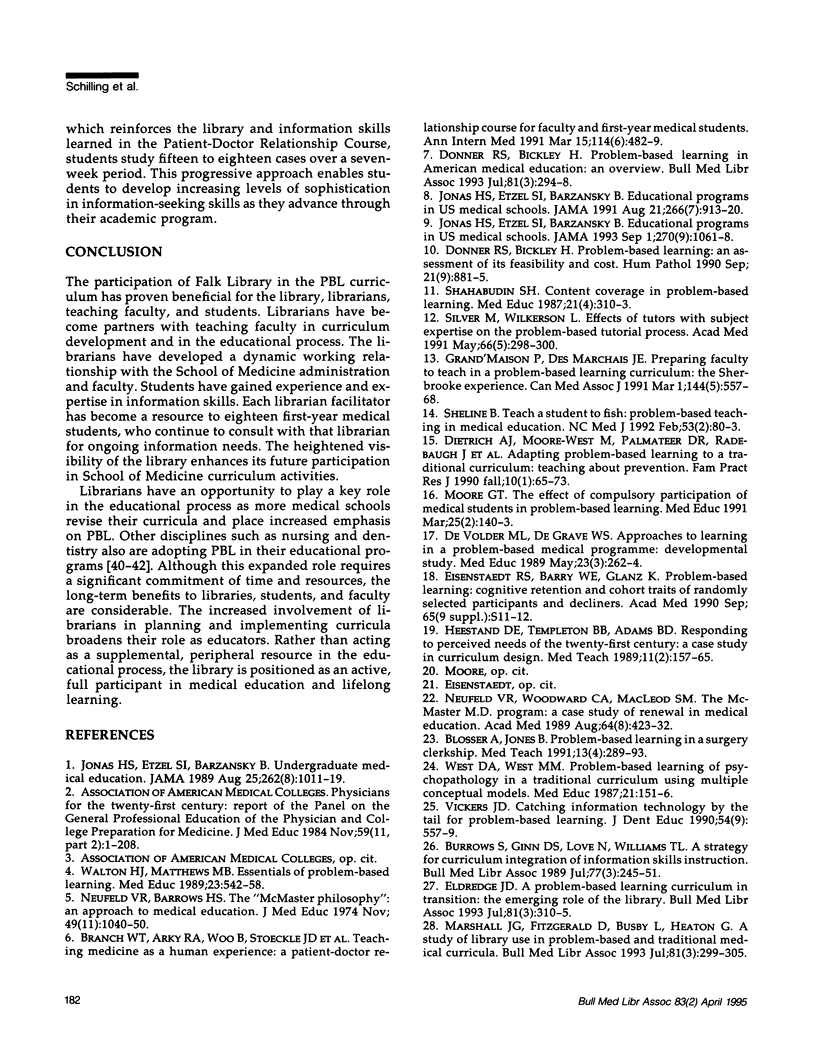
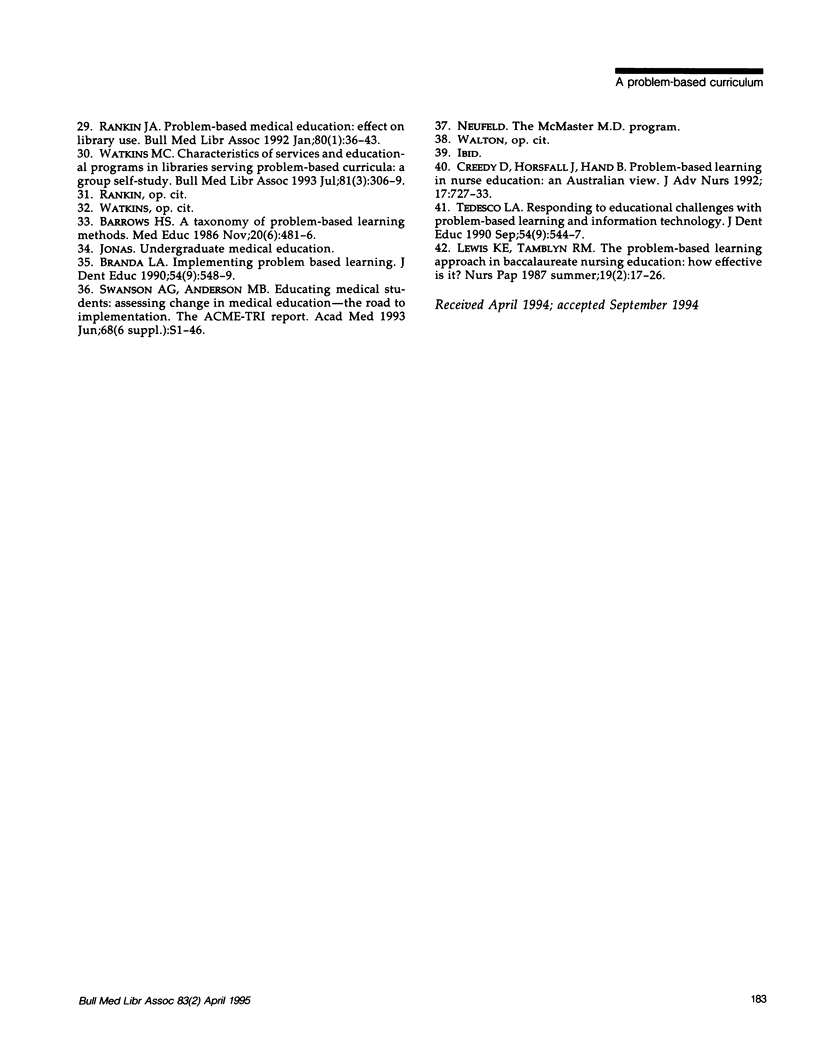
Selected References
These references are in PubMed. This may not be the complete list of references from this article.
- Barrows H. S. A taxonomy of problem-based learning methods. Med Educ. 1986 Nov;20(6):481–486. doi: 10.1111/j.1365-2923.1986.tb01386.x. [DOI] [PubMed] [Google Scholar]
- Blosser A., Jones B. Problem-based learning in a surgery clerkship. Med Teach. 1991;13(4):289–298. doi: 10.3109/01421599109089907. [DOI] [PubMed] [Google Scholar]
- Branch W. T., Arky R. A., Woo B., Stoeckle J. D., Levy D. B., Taylor W. C. Teaching medicine as a human experience: a patient-doctor relationship course for faculty and first-year medical students. Ann Intern Med. 1991 Mar 15;114(6):482–489. doi: 10.7326/0003-4819-114-6-482. [DOI] [PubMed] [Google Scholar]
- Branda L. A. Implementing problem based learning. J Dent Educ. 1990 Sep;54(9):548–549. [PubMed] [Google Scholar]
- Burrows S., Ginn D. S., Love N., Williams T. L. A strategy for curriculum integration of information skills instruction. Bull Med Libr Assoc. 1989 Jul;77(3):245–251. [PMC free article] [PubMed] [Google Scholar]
- Creedy D., Horsfall J., Hand B. Problem-based learning in nurse education: an Australian view. J Adv Nurs. 1992 Jun;17(6):727–733. doi: 10.1111/j.1365-2648.1992.tb01971.x. [DOI] [PubMed] [Google Scholar]
- De Volder M. L., De Grave W. S. Approaches to learning in a problem-based medical programme: a developmental study. Med Educ. 1989 May;23(3):262–264. doi: 10.1111/j.1365-2923.1989.tb01542.x. [DOI] [PubMed] [Google Scholar]
- Dietrich A. J., Moore-West M., Palmateer D. R., Radebaugh J., Reed S., Clauson B. Adapting problem-based learning to a traditional curriculum: teaching about prevention. Fam Pract Res J. 1990 Fall;10(1):65–73. [PubMed] [Google Scholar]
- Donner R. S., Bickley H. Problem-based learning in American medical education: an overview. Bull Med Libr Assoc. 1993 Jul;81(3):294–298. [PMC free article] [PubMed] [Google Scholar]
- Donner R. S., Bickley H. Problem-based learning: an assessment of its feasibility and cost. Hum Pathol. 1990 Sep;21(9):881–885. doi: 10.1016/0046-8177(90)90170-a. [DOI] [PubMed] [Google Scholar]
- Eisenstaedt R. S., Barry W. E., Glanz K. Problem-based learning: cognitive retention and cohort traits of randomly selected participants and decliners. Acad Med. 1990 Sep;65(9 Suppl):S11–S12. doi: 10.1097/00001888-199009000-00020. [DOI] [PubMed] [Google Scholar]
- Eldredge J. D. A problem-based learning curriculum in transition: the emerging role of the library. Bull Med Libr Assoc. 1993 Jul;81(3):310–315. [PMC free article] [PubMed] [Google Scholar]
- Grand'Maison P., Des Marchais J. E. Preparing faculty to teach in a problem-based learning curriculum: the Sherbrooke experience. CMAJ. 1991 Mar 1;144(5):557–562. [PMC free article] [PubMed] [Google Scholar]
- Heestand D. E., Templeton B. B., Adams B. D. Responding to perceived needs of the twenty-first century: a case study in curriculum design. Med Teach. 1989;11(2):157–167. doi: 10.3109/01421598909146319. [DOI] [PubMed] [Google Scholar]
- Jonas H. S., Etzel S. I., Barzansky B. Educational programs in US medical schools. JAMA. 1991 Aug 21;266(7):913–920. [PubMed] [Google Scholar]
- Jonas H. S., Etzel S. I., Barzansky B. Educational programs in US medical schools. JAMA. 1993 Sep 1;270(9):1061–1068. [PubMed] [Google Scholar]
- Jonas H. S., Etzel S. I., Barzansky B. Undergraduate medical education. JAMA. 1989 Aug 25;262(8):1011–1019. [PubMed] [Google Scholar]
- Lewis K. E., Tamblyn R. M. The problem-based learning approach in baccalaureate nursing education: how effective is it? Nurs Pap. 1987 Summer;19(2):17–26. [PubMed] [Google Scholar]
- Marshall J. G., Fitzgerald D., Busby L., Heaton G. A study of library use in problem-based and traditional medical curricula. Bull Med Libr Assoc. 1993 Jul;81(3):299–305. [PMC free article] [PubMed] [Google Scholar]
- Moore G. T. The effect of compulsory participation of medical students in problem-based learning. Med Educ. 1991 Mar;25(2):140–143. doi: 10.1111/j.1365-2923.1991.tb00040.x. [DOI] [PubMed] [Google Scholar]
- Neufeld V. R., Barrows H. S. The "McMaster Philosophy": an approach to medical education. J Med Educ. 1974 Nov;49(11):1040–1050. [PubMed] [Google Scholar]
- Neufeld V. R., Woodward C. A., MacLeod S. M. The McMaster M.D. program: a case study of renewal in medical education. Acad Med. 1989 Aug;64(8):423–432. doi: 10.1097/00001888-198908000-00001. [DOI] [PubMed] [Google Scholar]
- Rankin J. A. Problem-based medical education: effect on library use. Bull Med Libr Assoc. 1992 Jan;80(1):36–43. [PMC free article] [PubMed] [Google Scholar]
- Shahabudin S. H. Content coverage in problem-based learning. Med Educ. 1987 Jul;21(4):310–313. doi: 10.1111/j.1365-2923.1987.tb00369.x. [DOI] [PubMed] [Google Scholar]
- Sheline B. Teach a student to fish. Problem-based teaching in medical education. N C Med J. 1992 Feb;53(2):80–83. [PubMed] [Google Scholar]
- Silver M., Wilkerson L. A. Effects of tutors with subject expertise on the problem-based tutorial process. Acad Med. 1991 May;66(5):298–300. doi: 10.1097/00001888-199105000-00017. [DOI] [PubMed] [Google Scholar]
- Swanson A. G., Anderson M. B. Educating medical students. Assessing change in medical education--the road to implementation. Acad Med. 1993 Jun;68(6 Suppl):S1–46. doi: 10.1097/00001888-199306000-00014. [DOI] [PubMed] [Google Scholar]
- Tedesco L. A. Responding to educational challenges with problem-based learning and information technology. J Dent Educ. 1990 Sep;54(9):544–547. [PubMed] [Google Scholar]
- Vickers J. D. Catching information technology by the tail for problem-based learning. J Dent Educ. 1990 Sep;54(9):557–559. [PubMed] [Google Scholar]
- Walton H. J., Matthews M. B. Essentials of problem-based learning. Med Educ. 1989 Nov;23(6):542–558. doi: 10.1111/j.1365-2923.1989.tb01581.x. [DOI] [PubMed] [Google Scholar]
- Watkins M. C. Characteristics of services and educational programs in libraries serving problem-based curricula: a group self-study. Bull Med Libr Assoc. 1993 Jul;81(3):306–309. [PMC free article] [PubMed] [Google Scholar]
- West D. A., West M. M. Problem-based learning of psychopathology in a traditional curriculum using multiple conceptual models. Med Educ. 1987 Mar;21(2):151–156. doi: 10.1111/j.1365-2923.1987.tb00682.x. [DOI] [PubMed] [Google Scholar]


